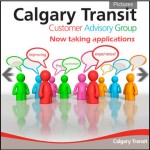In October 2007, I started in my current position as an Executive Director of a nonprofit. As many EDs quickly discover, the job description and what you actually end up doing can be two very different things. Part of that evolution for me at Bow Cliff Seniors has been the increased emphasis on transportation issues facing our members: driving cessation, concerns about snow removal in neighbourhoods, changes in transit routes as the new West LRT line is developed, and challenges with Access Calgary and taxi wait times as a result of increased demand for these services, and so on. And, like many Executive Directors, I work best in collaboration.
One of the committees that I sit on, the ElderNet Transportation Planning Table, has been working on a mapping strategy to look at where seniors travel in our city and where the gaps are. It’s been a fascinating process already: learning that the trip from one senior centre to a hospital in the same city quadrant can take up to two hours on transit, while another transit route from a hospital to several care facilities has its last bus of the evening leave 15 minutes before visiting hours are over, has us thinking about “what” people are doing when they use transit. This is starting to make the news in Toronto as well: proposed cuts to routes would impact people who are mobile (War on Roller Derby) and not-so-mobile (Fiorito: Cuts threaten bus service to Toronto’s deaf-blind community).
Another collaboration opportunity has been the involvement of nursing students from the University of Calgary at our centre. This semester, the group is looking at how our members get to the centre, get groceries and get themselves to health services on a regular basis. I’ve also encouraged them to do a community survey to assess walking, transit and driving issues in the immediate neighbourhood, as keeping people engaged in community means being able to access it. It will be interesting to see what gaps they find here in relation to the bigger ElderNet project.
This week I’m also meeting with the coordinator of Get Up and Go, which connects seniors with “buddies” in an attempt to get people to ride transit. I’m hoping that the program will be a fit for BCS members, both as a way of getting more people to the centre (so they can participate in programs, access services, and not be isolated!) but also as another way of sparking a transit advocacy strategy process in the community. I still think the key to getting seniors using transit is to get them on it before they’re seniors, but that’s going to be a bigger project. (Hmmm….)
Trying to address social isolation without looking at root causes like transportation is a futile exercise. I’m glad that there are so many opportunities to work with others in the community, and I’m glad so many of them are recognizing that our transportation systems include more than individual vehicle ownership. What a radical concept, non?
(Cross-posted at Zero-Fare Canada who kindly invited me to post with them. Go check them out!)

